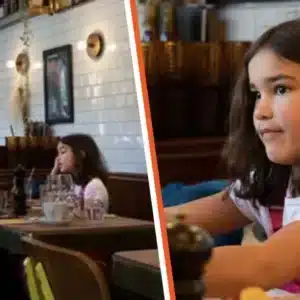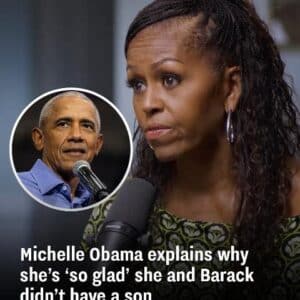I spent most of my life believing my father had abandoned me.
No warning. No explanation. Just a shadow that slipped out of my childhood and never looked back.
He was the ghost my mother refused to name. A blurred face in the corners of photo albums. A story that started and ended with silence.
“He walked out,” she told me once. “That’s all you need to know.”
And for years, I believed her. Why wouldn’t I?
Until the day he died—and a stranger handed me a silver key that unraveled everything I thought I knew.
It began when I was seven. I found a birthday card in the trash, sealed in a neat white envelope. My name was written in elegant, deliberate handwriting. It felt… careful. Familiar in a way I didn’t understand.
“Mom?” I called.
She glanced at it—and her face went stone cold.
“Throw that away,” she said.
“But… it’s for me.”
“No,” she snapped. “It’s from him.”
I blinked. “Who?”
“You know who,” she hissed. “Your father.”
I hesitated. “Can I open it?”
Her answer was quick. Harsh. “No. He doesn’t get to pretend now. He made his choice.”
She took it and shoved it back into the garbage, like it meant nothing. Like I meant nothing.
I didn’t argue. I was too young to understand the weight of what had just happened. But I never forgot the look in her eyes.
When I was twelve, I asked again.
“Why did he leave?”
She folded towels harder than she needed to. “Because he didn’t want us. That’s all there is.”
“But did he try—?”
“No ‘but.’ Stop asking. He’s not someone worth knowing.”
So I stopped asking. I stopped wondering.
By the time I was twenty-five, he was a closed chapter I never even read.
Until a quiet Thursday morning, when my phone buzzed with an unknown number.
I almost let it go to voicemail. But something made me pick up.
“Is this Emma Carlson?” a woman asked. Her voice trembled, barely above a whisper.
“Yes… who is this?”
“I’m Laura,” she said. “I… I’m your father’s wife. He passed away last week.”
The world fell silent.
“I thought you should know,” she added gently. “The funeral is tomorrow. I understand if you can’t come… but I think he would’ve wanted you there.”
I didn’t respond. I couldn’t.
The next day, I sat in my car for ten minutes outside the chapel. I didn’t feel like I belonged, but something pulled me in anyway.
I sat in the back, hoping no one would notice.
But someone did.
A woman in her fifties with tired eyes and a soft black coat slid into the pew beside me.
“Emma?” she whispered.
I nodded.
“I’m Laura,” she said. “I’m really… I’m really glad you came.”
After the service, she touched my arm.
“There’s something he wanted you to have,” she said. “Something he kept for years.”
From her purse, she pulled out a small silver key.
“He never stopped thinking about you,” she said quietly. “Would you come with me? To the lawyer’s office?”
I don’t know why I said yes. Maybe I was numb. Maybe I just needed to know.
The office smelled like leather and dust and something older than time.
The lawyer—a man in a dark navy suit—greeted us with a calm nod. “Mr. Carlson left very specific instructions.”
“To his daughter, Emma,” he read, “he leaves the contents of his personal safe, a trust fund, and a written letter.”
I froze. “He mentioned me? By name?”
The lawyer nodded. “Many times.”
He set a small black safe on the table. Laura slid the key into the lock. It clicked.
Inside were folders, yellowed letters, court documents, and a thick envelope labeled “Emma.”
“These,” the lawyer said gently, “are copies of multiple petitions for visitation. Your father filed them every year for five years.”
I opened the files. There were hearing dates. Legal briefs. Letters sent and returned unopened.
“He was never accused of abuse or instability,” the lawyer continued. “The only thing submitted was your mother’s statement that he was… emotionally unfit. But no evidence. Just her word.”
I stared at the paper. My hands shook.
“He remarried her former best friend,” the lawyer added carefully. “It caused a… deep rift. One she never recovered from.”
Laura nodded beside me, her face pale. “She blocked every attempt he made to contact you.”
I opened the envelope.
Inside were birthday cards—years’ worth—still sealed. Photos. Copies of social media posts. Newspaper clippings. Graduation announcements.
He had followed my life… from afar.
“There’s more,” the lawyer said. “A letter. And the trust he left behind. He said it was ‘for the life he never got to share.’”
I opened the letter with trembling fingers.
“To my daughter Emma,
I wish I could’ve told you all of this in person. I tried. So many times.
I hope this helps you build the life I always imagined for you.
I never stopped loving you. Not for a second.”
I didn’t cry at first.
But when Laura brought me to their house, led me to the small white door at the end of the hallway, and opened it—I shattered.
It was a shrine. To me.
Photos, art projects, clippings from school. My name written a hundred times. A flower from my graduation bouquet—dried and pressed on the wall.
“He stood in the back,” Laura whispered. “He just wanted to see you.”
I couldn’t speak. My whole life, I thought he vanished.
But he had been here. Watching. Waiting. Hoping.
He called it “The Hope Room.”
“He said he’d never change it,” Laura added. “Not until you walked through the door.”
And now… I had.
I visited Laura every week after that. We talked. She showed me photos, stories, videos.
Then one day, she said, “Would you like to meet your brother and sister?”
I said yes.
And when I walked in, Caleb and Lily hugged me like they’d known me forever.
“Dad always said we had a sister,” Lily said, beaming. “He called you his missing piece.”
That night, I cried for everything I lost.
But I also cried for what I found.
Because sometimes the truth doesn’t come when you ask. Sometimes it waits—quietly, patiently, behind a locked door—until you’re strong enough to open it.





